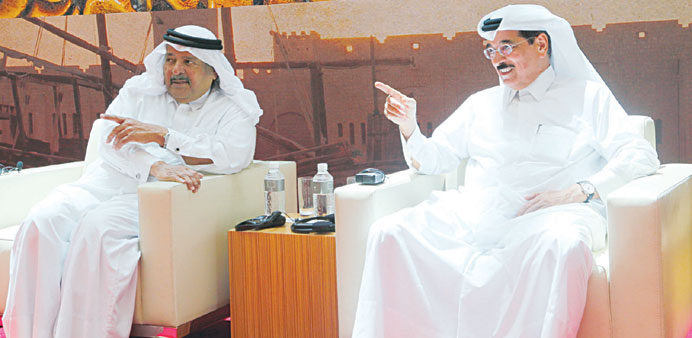|
The importance of preserving and promoting Qatari culture and heritage and Arab and Islamic identity was highlighted by HE Dr Hamad bin Abdulaziz al-Kuwari, the Minister of Culture, Arts and Heritage, in a lecture to mark the conclusion of the exhibition ‘Travelling Through Arts and Times’, a collaboration between the Sheikh Faisal bin Qassim Al-Thani Museum and the Carnegie Mellon University Qatar (CMU-Q). |
In his speech, Dr al-Kuwari praised Qatari businessman and Museum founder HE Sheikh Faisal as a ‘role model to be followed by others’, in his life-long support of heritage and culture.
The exhibition at CMU-Q, under the patronage of HH the Father Emir, Sheikh Hamad bin Khalifa al-Thani, featured more than 160 rare artefacts from Sheikh Faisal’s extensive private collection and included priceless gold jewellery, vintage cars and 7th Century gold coins, all going on public display for the first time, along with manuscripts, Islamic art and artefacts of Qatari heritage.
The exhibition marked the 10th anniversary of the opening of Carnegie Mellon University in Qatar’s campus at Education City and showcased the richness of Qatari and Islamic culture, heritage and civilisation.
At the event, also attended by HE the Minister of Energy and Industry, Dr Mohamed bin Saleh al-Sada, and CMU-Q dean and CEO Dr Ilker Baybars, as well as leaders of business and academia, Dr al-Kuwari announced that Qatar had successfully registered falconry on Unesco’s Intangible Cultural Heritage list, and is planning to also add Arabic coffee and Al Majlis to the list, which supports and protects important aspects of culture and heritage across the world.
In his lecture ‘The role of private museums in the development of culture and the definition of the national and Islamic heritage’, Dr al-Kuwari said culture and the preservation of national and Islamic identity were crucial as Qatar undergoes significant economic and social development.
“Development leads to advancement, but not at the expense of identity and heritage. Identity is one of the most important topics in the National Strategy and National Vision,” he said.
Dr al- Kuwari stressed the important role played by individuals and the private sector in the promotion of culture and heritage in Qatar and praised Sheikh Faisal for his role in this field. “We have to express our gratitude to HE Sheikh Faisal bin Qassim al-Thani – he is a role model to be followed by others. He combined important items of heritage and culture, classified them and preserved them. This is not only a gain to the State of Qatar but also to our Islamic and humanitarian heritage,” he said.
Dr al- Kuwari also welcomed the active role played by universities in educating young people about the history and society of Qatar and encouraged further collaboration in the future between society and higher education. “The efforts by the private sector and universities, through their programmes and activities, enables us to present our heritage and reinforces its importance,” he told his audience.
Sheikh Faisal spoke of his ‘passion’ for his world-renowned museum in Shahaniyah and his life-long commitment to raising awareness of and improving understanding about Qatar’s history, culture and heritage.
“What makes me happiest is the foundation of this museum. We have developed a real relationship with the people of Qatar. I feel that I am serving the State of Qatar,” he said.
“This is a passion very close to my heart. When I was a young man, I was driven by business. Now my greatest passion is the museum.”
Sheikh Faisal described how childhood visits to museums in Europe had greatly impressed him: “The things there are still ingrained in my mind. They are indelible memories. Museums are very important in society – when a person visits a museum, he lives both in the present and the past.”
Sheikh Faisal announced that the success of the temporary exhibition at CMUQ, which has had visitors from across the world, has sparked plans to have mobile exhibitions with key artefacts from the Sheikh Faisal museum travelling to Europe and the US.
“The aim is to disseminate our thinking and ideas about Arabs and our society. We want our exhibits not to stay static in Qatar but to open up to other parts of the world. This would complement existing cultural outreach programmes which the museum runs in schools and universities in Qatar,” he said.
He also announced plans to build a lecture theatre at the museum, to host educational sessions on Qatari history.

